My Doctoral Fucking Thesis on Wonder Girl
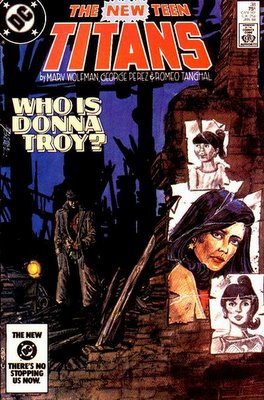
"Who is Donna Troy?" demands the cover of The New Teen Titans #38.
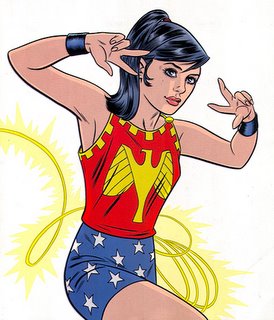
"I am Donna Troy," says the girl voguing in her Wonder Woman pajamas.
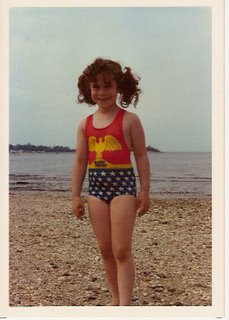
"I am Donna Troy," says Susie Felber.
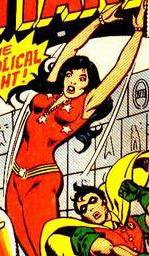
"I am Donna Troy," says The girl who must have been doing her laundry that day and didn't have anything else clean.
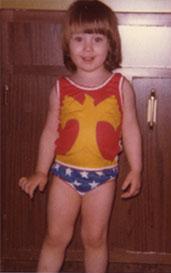
"I am Donna Troy," says Jen Dziura.

"I am Donna Troy," says Elvira, Mistress of the Dark.
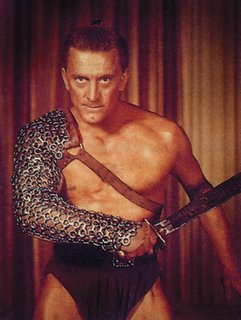
"I am Donna Troy," says Spartacus.
Donna Troy was Wonder Girl - a pioneer in the fine art of dressing like Wonder Woman. Indeed, everyone who has ever dressed up like Wonder Woman owes a little something to Donna Troy. I take the responsibility as the only writer for this Wonder Woman blog who reads comics very seriously. I recently decided that no discussion of people dressed as Wonder Woman would be complete without a close look at the walking fashion/continuity headache that is Donna Troy. That meant that it was up to me to write that post. The biggest problem with that is that I consciously avoid any comics that feature Wonder Girl. So, I started reading some comics that have Wonder Girl in them, and the first thing that I found was that my decision to avoid Wonder Girl comics was one of the wisest choices I have ever made in my life. Still, since I would do anything for my loyal readership (which, as far as I can tell consists only of Jen (Hi, Jen!)), I soldiered on.
The next obstacle I encountered was that there were way too many tangents that were not directly related to Wonder Girl, but some of which I thought were important for context. So, as penance, after long, unwieldy tangents, I have included pictures of Nikki Nova.
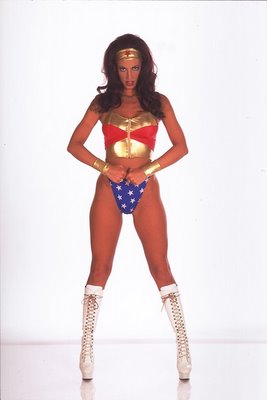
Although I write a lot about D.C., particularly in this blog, at heart, I am a Marvel Zombie. When I was much younger I could never really get into D.C. and read exclusively Marvel Comics. As I grew older, I became more open-minded, and I have read and enjoyed many comics from D.C., but currently I find that the only comics I pick up monthly are Exiles, Cable & Deadpool, Fallen Angel, and X-Factor, none of which are printed by D.C. By the way, you should all read X-Factor, too. Really. I don't care if you don't read comics, read X-Factor anyway. Peter David is a wonderful writer and should be encouraged.
I'm not sure what it is exactly that attracts me to Marvel Comics. I know that the bulk of Marvel Comics are really awful, and I mean really, really awful, but there's something in the good ones and even some of the mediocre ones that is never quite captured in D.C. Marvel Comics are just more fun. Of course, you should keep in mind that any criticism I have of D.C. does not extend to Vertigo. Vertigo is a branch of D.C. that prints comics aimed at adults, and I would never speak ill of it, except the part of it that is written by Grant Morrison.
The problem with Marvel is that D.C. was around first, so people are quick to accuse Marvel of being derivative. The easiest retort to that is, "People who create Aquaman shouldn't throw stones." For those of you who couldn't figure out on your own that talking to fish doesn't make a very exciting superhero, it doesn't, but I think his lameness is doubled by the fact that he's really just a cheap knock-off of a Marvel character called Namor the Sub-Mariner. Aquaman's name isn't even as clever.
For another example, people sometimes point out some odd similarities between The X-Men and Doom Patrol, which were created at about the same time, but what they usually fail to mention is that The X-Men was a better comic in almost every way. As ridiculous a premise as a superhero high school is, The X-Men did some interesting things with it. Now, I wouldn't go so far as to say that The X-Men was a good comic in the early sixties, just much better than Doom Patrol. The only edge that Doom Patrol has over The X-Men is that Grant Morrison didn't fuck Doom Patrol up quite so badly, but, then again, it's hard to imagine anyone fucking anything up as badly as Grant Morrison fucked up the X-Men. In fact, I think "Grant Morrison writing the X-Men" should replace "the blind leading the blind" as the accepted metaphor for people having no idea what they're doing. I think "Grant Morrison" should replace "SNAFU" as military slang for something going horribly, horribly wrong.
Words cannot tell how much I hate Grant Morrison, and yet here I am using words to do just that. Grant Morrison is a one-eyed fuck monkey, meaning that my distaste for him is so strong that it shorts out the part of my brain responsible for coming up with epithets. Of course, I liked Arkham Asylum. Dave McKean's work was great, and the writing, although stupid, was still readable. I had hoped that Grant Morrison would develop into an entertainingly stupid writer instead of an obnoxiously stupid writer. Unfortunately, he did just the opposite.
Perhaps I should explain for those of you who didn't notice the subtle stupidity in Arkham Asylum. Take for example the character of the Joker. For those of you who don't read comics, the Joker's origin story is as nebulous as his modus operandi. Different writers have fundamentally different takes on his character, and not even his most basic characteristics are set in stone, like in Frank Miller's The Dark Knight Returns, where the Joker goes the whole story without telling a single joke, because Miller seems to have missed the word "Joke" in the character's name. What remains fairly constant in the origin story is that the Joker had accidentally fallen into a vat of unspecified chemicals (sort of like the ones that gave the Flash his powers). The chemicals bleached the Joker's skin and hair (astoundingly evenly) and distorted his facial features (perfectly symmetrically) and caused some neurological damage (usually manifesting itself in schizotypal or violent tendencies). You wouldn't expect someone like that to be particularly dangerous, but he was quite amusing, so they kept bringing him back. In one comic I have from the 60's (when comics were regarded by their writers as disposable children's fantasy and nobody took them very seriously), the Joker was diagnosed as having hebephrenia (NOTE: it's a real medical condition), a form of schizophrenia characterized by delusions, regressive behaviour, and inappropriate laughter. The doctor in Grant Morrison's Arkham Asylum had a slightly different diagnosis:
"The Joker's a special case. Some of us feel he may be beyond treatment. In fact we're not even sure if he can be properly defined as insane... It's quite possible we may actually be looking at some kind of super-sanity here. A brilliant new modification of human perception. More suited to urban life at the end of the twentieth century... Unlike you and I, the Joker seems to have no control over the sensory information he's receiving from the outside world. He can only cope with that chaotic barrage of input by going with the flow. That's why some days he's a mischievous clown, others a psychopathic killer. He has no real personality. He creates himself each day. He sees himself as the lord of misrule, and the world as a theatre of the absurd."It's cute how Morrison is trying to account for different writers creating varying identities for the Joker, but notice how this trained doctor who is uncommonly fond of sentence fragments sees dissociative identity disorder as a perfectly acceptable approach to life and thinks that the only thing wrong with the guy who dresses up as a clown and kills people is that he's too sane. Why didn't anyone think of this sooner?
The little absurdities in Arkham Asylum were nothing, though, compared to New X-Men. Granted, I haven't read his entire run of the series, but I don't think it's my fault. Even hearing about some of these stories makes my head throb violently. Keep in mind that, despite my musings about the Flash, I am usually a great advocate of suspension of disbelief. For instance, I think that The Saga of the Swamp Thing is a wonderful, intelligent comic, although it doesn't seem entirely scientifically plausible. You just have to remind yourself that Alan Moore's job is to write horror comics, not to study planariae and get on with your life. I try to be forgiving of ludicrous plot elements. I had been through at least five different Supergirl origin stories, each one more insanely convoluted than the last. Remember when she was a puddle of synthetic goo that Lex Luthor had created based on Superman's girlfriend's genetic template? I got through that relatively unfazed, but Grant Morrison's New X-Men stories pushed my suspension of disbelief to the breaking point. The major plot points in the issues I missed were relayed to me by my friend Steffan in conversations like the following:
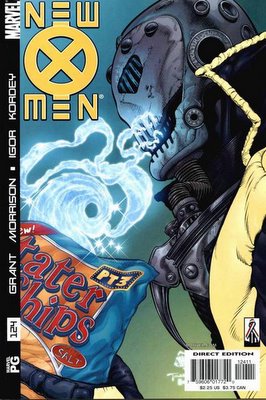
ME: So what's with the robot?
STEFFAN: You mean Xorn?
ME: All right, what's with Xorn the robot?
STEFFAN: He's a mutant.
ME: So ... someone built a robot and it mutated?
STEFFAN: No, he was born a robot.
ME: So ... he's a person who looks like a robot?
STEFFAN: Sort of. More like his DNA was altered so that he's a robot.
ME: So does he do anything other than have a stupid origin story?
STEFFAN: His brain is a star.
ME: You mean ... it ... has its own sitcom or something?
STEFFAN: No, it's a star. Like a celestial body. That kind of star.
ME: Does Grant Morrison know what a star is? For that matter, does he know what a brain is?
STEFFAN: Apparently not.
ME: Damn it. My head is throbbing again.
Even with all the help that Steffan gave me in making the plotlines more manageable, nothing could prepare me for the horror that was "Planet X." "Planet X" was the worst comic that I have ever read and that includes all of the comics that I read because they're terrible. In fact, "Planet X" gave me a new understanding of kitsch. Some people think of kitsch as a quality of art that is "so bad it's good," which I now see to be a fallacy, because "Planet X" was much worse than "so bad it's good," but wasn't entertaining at all. It was so bad it's really horribly scarringly bad.
Although I don't expect fantasy and science fiction writers to be scientific geniuses, there are certain basic facts that you shouldn't need a medical degree to know, things like that if you lose an eye, it doesn't grow back; that most biological functions (heartbeat, respiration, etc.) cease after death; and that in a situation where you are stranded without any source of food, you cannot survive indefinitely by eating your own arm (even if your arm heals, you cannot gain enough energy by eating your arm to sustain you and to heal your arm, providing you with more arm meat - the human body is not a perpetual motion machine). Over the course of "Planet X," Grant Morrison demonstrates that all of these concepts and more are beyond his grasp.
Also, if you're going to make reference to the classic story arc "The Phoenix Saga," it would be helpful to actually read it. Then maybe you'd know that Jean Grey chose the codename "Phoenix" as a metaphor for how she was believed dead and returned, like a Phoenix rising from the ashes. She was never actually dead, nor is she actually a Phoenix. That means she didn't hatch out of an egg, you fucking special ed dropout.
Some people defend the comic by saying that it showcases Magneto's brilliance. No, really, multiple unrelated people have mentioned this in discussions of how bad this comic is. Really, Magneto's characterization was the worst part of the story, although I realize that picking out the worst part of "Planet X" is a task akin to shitting in a bucket for a month and then trying to determine which of the turds smells the worst. First of all, the entire thing was completely out of character for Magneto. I would point out specifically what actions and bits of dialogue Magneto would never do or say, but it wasn't like there were any specific aspects of Magneto's personality that Morrison didn't understand; it was more like he had never read a comic with Magneto in it. If he had, he never would have made a big surprise twist be that Magneto was still alive. Nobody thought that Magneto was dead. Magneto has been brought back so many times, it would have been a bigger surprise if they had found Magneto's body and it wasn't a hoax or a robot or a clone, but it was really him and he was really dead and they weren't going to bring him back to life. There's an exercise you "Magneto's brilliance" people can do: Cut out pictures of Apocalypse or Diablo or Dr. Doom or Brainiac or Ra's-al-Ghul and paste them over every picture of Magneto in the comic. Notice how it doesn't change the story in any significant way. I think he wrote the entire script with the villain identified as "[insert villain here]" and decided to go with Magneto because nobody would expect that.
Some people say that Magneto joining the X-Men under a false identity and curing Xavier's paralysis to gain his trust was a great plot device. Well, sure it is, but you know what would have been more brilliant? Not curing Xavier's paralysis and skipping right to the taking over the world part of the plan. Why was gaining Xavier's trust such a big priority anyway? Remember when Magneto was part of the X-Men, with no false identity, just as Magneto? Or the other time he was part of the X-Men? Or the other time he was part of the X-Men? Or all those times when he saved Xavier's life? Or that time when Xavier left the Earth for a few years and hired Magneto to run the school? Or how Magneto and Xavier are best friends and had been since the Korean War? I don't think Magneto really needed to come up with a fake name and a miracle cure for paralysis to win Xavier's trust.
But I totally see why Magneto had to infiltrate the school. He had to amass an army. And what an army it was. Between the guy who can jump really far and the guy who had a beak instead of a mouth, I don't see how his bid for world domination ever failed. How could Magneto have foreseen that they would be even less useful than my description makes them sound?
Then again, if he had jumped right into his world domination plan, then people might have noticed that it consisted primarily of knocking a few buildings over. It wasn't so much a coup as it was a temper tantrum. But the part of the plan where he becomes a pathetic, washed-up drug addict could only be described as a stroke of genius. I certainly never would have thought of that.
I would complain about how it is Wolverine that finally kills Magneto - that the guy whose bones are laced with metal kills the guy who has the power to control metal - but at that point, I was just glad it was over. And I've only scratched the surface of how bad this thing is. I haven't even mentioned how painful and forced every single line of dialogue is, how shallow and one-dimensional ever character is, nor how devoid of any sort of emotional stimulation the entire story is, but I really should get back to Wonder Girl.
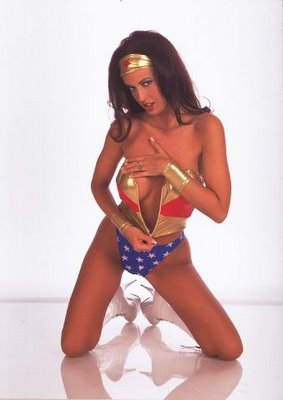
Wonder Girl's origin starts in the pages of More Fun Comics - the comic book so insecure that it needs to put the word "FUN" in big letters on the cover, lest the reader start to question how much fun these comics really are.

There was a recurring feature in More Fun called "Superboy." The concept was simple - Superman must have had some zany adventures before leaving his boyhood home of Smallville, and in "Superboy," you got to see the exploits of li'l Clark Kent. Despite the fact that Smallville has got to be the dumbest name for a town I have ever heard, the feature was immensely popular. Then in 1959, about 15 years after Superboy's first appearance, a writer named Robert Kanigher emerged. He was a bold man, one with the courage to dream the impossible. "What if," he posed, "we did the exact same thing with Wonder Woman?" The entire company was in an uproar. "This Robert Kanigher must be mad!" they said. Still, mad or not, an idea that innovative was worth any risk.
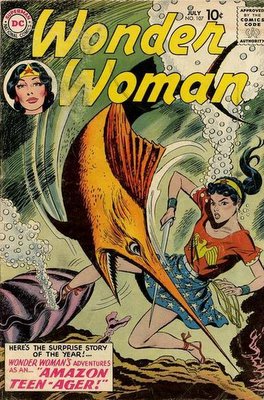
 Unfortunately, it began to look like Robert Kanigher was indeed losing his mind. I don't mean for creating Wonder Girl. The world needed to know what it was like for Wonder Woman growing up a heroine on Paradise Island. When he started writing about Wonder Woman as a baby (Wonder Tot (right)), that was sort of fucked up, but not really crazy. Even his use of the phrase "saucy Amazon babe" can be chalked up to mere eccentricity. No, the point at which it was safe to say that the pressure of writing Wonder Woman comics had finally gotten to him was Wonder Woman #124 - a story called "The Impossible Day."
Unfortunately, it began to look like Robert Kanigher was indeed losing his mind. I don't mean for creating Wonder Girl. The world needed to know what it was like for Wonder Woman growing up a heroine on Paradise Island. When he started writing about Wonder Woman as a baby (Wonder Tot (right)), that was sort of fucked up, but not really crazy. Even his use of the phrase "saucy Amazon babe" can be chalked up to mere eccentricity. No, the point at which it was safe to say that the pressure of writing Wonder Woman comics had finally gotten to him was Wonder Woman #124 - a story called "The Impossible Day."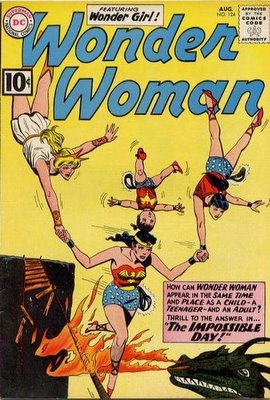
While you're pondering what sort of twisted, diseased mind could come up with something like that, I should tell you the premise of the comic - this was a story that Wonder Woman's mother Hippolyta made by splicing together films of Wonder Woman at different stages of her life. You may be wondering why she would do that. I know I am. I could sort of see splicing together three different Wonder Women if it has always been your dream to see an all-Wonder-Woman three-way, but this is her mother, and she's using home movies of her daughter as a baby. I don't think you could come up with an explanation that isn't horribly inappropriate. Maybe it's something simple. Kanigher had just decided that Hippolyta having way too much free time on her hands was a thrilling plot device. I'm going to stop thinking about this. The less I know about the thought process whose conclusion is Wonder Tot, the better.
In these "Impossible Stories" that Hippolyta made, Wonder Girl's role changed from young superhero to kid sidekick. Much like Stan Lee, I hate kid sidekicks. That's one thing that I think is great about Marvel - the dearth of kid sidekicks. In 1964, when Stan Lee brought Captain America back, the first thing Stan "The Man" did was kill his sidekick Bucky. You see, Stan Lee didn't get the nickname "The Man" for nothing. He got it for killing Bucky.
Sidekicks are those little kids who follow superheroes around and say, "Golly!" They are pathetic things that don't have any lives or identities of their own, so they have to ride the coattails of someone who is better than them in every conceivable way. They usually don't contribute much to stories, except for illustrating how irresponsible the superhero is for constantly putting the child's life in danger. Sidekicks very often need to be rescued from villains but they don't get killed nearly often enough. The idea behind sidekicks was that the readership of superhero comics were mostly adolescents, but the superheroes themselves were mostly adults, so the sidekicks were added for the readers to identify with. I don't think it really worked. Maybe I just hung out with the wrong people, but I never heard anyone say, "Robin is the greatest hero ever! I wish I could be Batman's bottom!" What I'm saying is that maybe some kids did relate to the kid sidekicks, but they were largely the same kids who related to Judy Garland, if you catch my meaning. No, that isn't just my own homophobic musing, there's research behind it.
"As our work went on we established the basic ingredients of the most numerous and widely read comic books: violence; sadism and cruelty; the superman philosophy, an offshoot of Nietzsche's superman who said, 'When you go to women, don't forget the whip.'-From Seduction of the Innocent by Dr. Fredric Wertham
We also found that what seemed at first a problem in child psychology had much wider implications. Why does our civilization give to the child not its best but its worst, in paper, in language, in art, in ideas? What is the social meaning of these supermen, superwomen, super-lovers, super boys, supergirls, super-ducks, super-mice, super-magicians, super-safecrackers?
How did Nietzsche get into the nursery?"
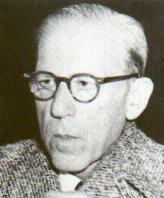 Allow me to introduce my friend, Dr. Wertham. Dr. Wertham was an uncommonly witty and astute pediatric psychiatrist who tried to figure out what may be the root cause of juvenile delinquency. He noticed the meritless and irresponsible writing in movies, television, and especially comic books that children were being exposed to and was shocked to find that parents and his colleagues in the psychiatric field were largely unaware of this problem. He set out to inform them of the possible adverse effects of their children's entertainment in his 1954 book, Seduction of the Innocent.
Allow me to introduce my friend, Dr. Wertham. Dr. Wertham was an uncommonly witty and astute pediatric psychiatrist who tried to figure out what may be the root cause of juvenile delinquency. He noticed the meritless and irresponsible writing in movies, television, and especially comic books that children were being exposed to and was shocked to find that parents and his colleagues in the psychiatric field were largely unaware of this problem. He set out to inform them of the possible adverse effects of their children's entertainment in his 1954 book, Seduction of the Innocent.I should explain that I am a staunch advocate of freedom of speech. In fact, I may be a bit of an extremist. I think that children don't always need to be shielded from objectionable words and ideas and that neonazis have the same rights to free speech that everyone else does - the audience should be allowed to judge for itself how rational, valid, or potentially harmful an idea is. Considering that I'm also a fan of comic books, it may seem paradoxical that I am at all a fan of Wertham's. The fact is that Wertham himself did not support censorship, nor was he opposed to comic books as a medium or fantasy/science fiction fandom. In fact, in his 1974 book, The World of Fanzines, he indicated how such fandom can be a positive creative influence. This may seem to contradict his previous works, but only to people who weren't actually familiar with his previous works. As with everything, it is too much to expect people to actually read what they are criticizing.
I don't think that Wertham was right about everything. I personally feel that there is some value in mindless entertainment. Also, his assumption of causality between violence in the media and violence in real life was not necessarily accurate. There is no question that even today the vast majority of comics glorify violence. Depending on how charitable a mood I'm in, I may concede that they encourage imitation. However, it should be noted how low a proportion of comic book readers become murderers or thieves or masked vigilantes.
 As I realized while reading Captain Britain comics, it's really sort of a shame that comics didn't inspire many copycat criminals. It's not that I am in favour of violent crime, but someone who is going to turn to a life of crime because of comic books or television shows is probably not very well-balanced anyway, and wouldn't it be nice if the crimes we had were more colourful? I doubt that organized crime would have quite as much of a stigma attached to it if there were a real gang based on the works of Lewis Carroll. Also, imagine how many lives would be saved if killers relied less on random shootings and more on elaborate death traps.
As I realized while reading Captain Britain comics, it's really sort of a shame that comics didn't inspire many copycat criminals. It's not that I am in favour of violent crime, but someone who is going to turn to a life of crime because of comic books or television shows is probably not very well-balanced anyway, and wouldn't it be nice if the crimes we had were more colourful? I doubt that organized crime would have quite as much of a stigma attached to it if there were a real gang based on the works of Lewis Carroll. Also, imagine how many lives would be saved if killers relied less on random shootings and more on elaborate death traps.Regardless, most of the problems that arose as a result of the book were not caused by what he had actually said, but by the way people reacted to it. The Comics Code Authority - an organization established to regulate the content of comic books - seems to have had admirable goals. However, instead of a higher standard being set for the comics, by censoring and limiting their content, the writing in comics suffered quite a bit. That is ironic considering that Wertham's primary complaint against comics was in the low standards of their writing.
It does not seem that the connotation of comics as being solely a children's medium was Wertham's intention. One of his biggest arguments was that children shouldn't be exposed to inappropriate comics, not that such comics shouldn't exist. Whether or not you think that the publishers' intent was to market comics featuring adult themes to children, the fact is that children were reading them, and it wasn't Wertham's fault for noticing that. Besides, Wertham also cited the harmful effects of television and film, and people aren't as inclined to dismiss them as juvenile media. The damage done to the comic book industry was considerable but it wasn't exactly what Wertham had wanted.
When I first set out to read Seduction of the Innocent, I had already read many analyses on the effect of the book, and most of them characterized Dr. Wertham as the Man Who Ruined Comics - a bigoted demagogue who was out to dispose of any idea that he found distasteful under the guise of protecting the children. I had intended to read it for amusement, to laugh at the crazy reactionary ideas, but, to my surprise, I found that it was far from reactionary and even farther from crazy. In the first chapter, Dr. Wertham revealed that he was dismissed as a crackpot by colleagues who did not think that comic books warranted analysis, yet he had not lost his sense of humour, and he persisted in his research out of what seemed to be a genuine concern for children's well-being.
As a comic book fan, I can say with surety that his observations on the content of comics, on the reaction of comic readers, and on the marketing tactics used were pretty much dead-on. I think the fact that Dr. Wertham is so widely regarded as paranoid and delusional by comic fans shows a remarkable lack of self-awareness. The passages that made specific reference to comics that I was familiar with were particularly delightful to read. The story of the child who died trying to imitate Superman was manipulation of the worst kind, but his only real complaint about Superman - that his stories contained so many scientific inaccuracies and implausibilities that they would undermine a child's understanding of physics - made me chuckle.
As for the allegations of sexually enticing content in comics, that is a bit more of a divisive topic. The thing is that accusations of subversive material in children's entertainment usually reveal more about the mindset of the accuser than about the source material. For instance, some people say that Shaggy from Scooby-Doo is a marijuana smoker. Although there is very little substance to the character, it is likely that he is imitative of a counter-culture that includes recreational drug use, but his creators had not intended him to even address the issue of drug use. So, although he is likely to share mannerisms with drug users, any specific reference to drug use is only in the mind of the viewer.
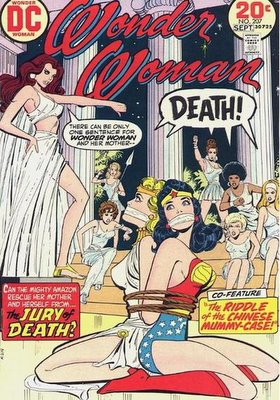
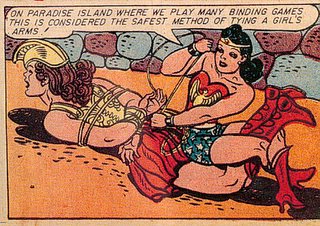 I would say that Dr. Wertham chose his targets well, though. For instance, he had some disparaging words to say about the lesbian bondage themes so prevalent in Wonder Woman. In this matter, as with most of the book, I agree with Dr. Wertham's premise, but not his conclusion. If anything, I think that there is not enough lesbian bondage in comics, but it's hard to deny that it's portrayed in Wonder Woman. Proponents of the You're-Reading-Too-Much-Into-This school of thought might point out that she fights crime with a lasso, so of course people are going to be tied up, but would be hard-pressed to find an example in Greek mythology or crime comics that indicates a lasso as an acceptable crime-fighting implement. Even among comic readers, it is widely accepted that the sexual undertones were an intentional touch by her creator, William Moulton Marston, who was himself an admitted polyamorist and sadomasochist (a polite way of saying "sexual deviant").
I would say that Dr. Wertham chose his targets well, though. For instance, he had some disparaging words to say about the lesbian bondage themes so prevalent in Wonder Woman. In this matter, as with most of the book, I agree with Dr. Wertham's premise, but not his conclusion. If anything, I think that there is not enough lesbian bondage in comics, but it's hard to deny that it's portrayed in Wonder Woman. Proponents of the You're-Reading-Too-Much-Into-This school of thought might point out that she fights crime with a lasso, so of course people are going to be tied up, but would be hard-pressed to find an example in Greek mythology or crime comics that indicates a lasso as an acceptable crime-fighting implement. Even among comic readers, it is widely accepted that the sexual undertones were an intentional touch by her creator, William Moulton Marston, who was himself an admitted polyamorist and sadomasochist (a polite way of saying "sexual deviant").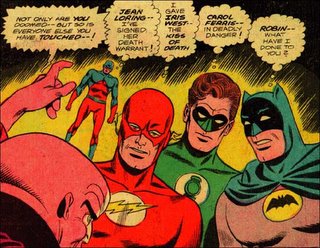 People sometimes accuse Dr. Wertham of homophobia for identifying Batman and Robin as icons of gay culture (for those of you who think that "gay culture" is just a recent phenomenon, they've been saying that for at least fifty years), but I don't think that's fair. I don't even think he's homophobic for implying that Batman comics might have caused some young men to become gay. I would say he was homophobic if he said something like that nowadays, but he was operating under the misapprehension that homosexuality was symptomatic of mental illness, and when searching for the cause it is understandable that he did not consider that it might be naturally occurring. That still doesn't invalidate his findings about Batman having a gay audience. Regardless of whether Bob Kane and Bill Finger had intended Bruce Wayne and Dick (if you think Dr. Wertham was above pointing out what a suggestive name "Dick" is, think again) Grayson to be a gay couple, the fact is that gay adolescents related to the character of Robin and his relationship with Batman. It is more likely that they had gay inclinations and imagined that they found approval for their lifestyle in the pages of Batman than that they decided to pursue a homosexual lifestyle because of a perceived endorsement from Batman comics as Wertham had presumed. Still, Dr. Wertham was nowhere close to being the first person to notice Batman's implied "alternative lifestyle," he was just the first person to publish a book that made reference to the phenomenon.
People sometimes accuse Dr. Wertham of homophobia for identifying Batman and Robin as icons of gay culture (for those of you who think that "gay culture" is just a recent phenomenon, they've been saying that for at least fifty years), but I don't think that's fair. I don't even think he's homophobic for implying that Batman comics might have caused some young men to become gay. I would say he was homophobic if he said something like that nowadays, but he was operating under the misapprehension that homosexuality was symptomatic of mental illness, and when searching for the cause it is understandable that he did not consider that it might be naturally occurring. That still doesn't invalidate his findings about Batman having a gay audience. Regardless of whether Bob Kane and Bill Finger had intended Bruce Wayne and Dick (if you think Dr. Wertham was above pointing out what a suggestive name "Dick" is, think again) Grayson to be a gay couple, the fact is that gay adolescents related to the character of Robin and his relationship with Batman. It is more likely that they had gay inclinations and imagined that they found approval for their lifestyle in the pages of Batman than that they decided to pursue a homosexual lifestyle because of a perceived endorsement from Batman comics as Wertham had presumed. Still, Dr. Wertham was nowhere close to being the first person to notice Batman's implied "alternative lifestyle," he was just the first person to publish a book that made reference to the phenomenon.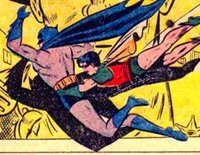 I find the most interesting thing about Batman and Robin's relationship to be that their partnership continued unabated even amidst the censorship and series cancellations that followed the release of Seduction of the Innocent. With the comic book industry in upheaval, they could not have claimed ignorance of the charges against them, and yet, if anything, Batman and Robin got even gayer. I wonder if this was more a refusal to validate Wertham's claims by even acknowledging them or an admission of guilt. Maybe they were deliberately trying to court a young homosexual male audience (not literally, of course (I think)).
I find the most interesting thing about Batman and Robin's relationship to be that their partnership continued unabated even amidst the censorship and series cancellations that followed the release of Seduction of the Innocent. With the comic book industry in upheaval, they could not have claimed ignorance of the charges against them, and yet, if anything, Batman and Robin got even gayer. I wonder if this was more a refusal to validate Wertham's claims by even acknowledging them or an admission of guilt. Maybe they were deliberately trying to court a young homosexual male audience (not literally, of course (I think)).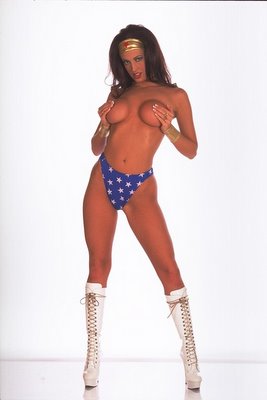
In the so-called "Silver Age" that followed the publication of Seduction of the Innocent, D.C. printed a comic called The Brave and the Bold, a versatile title that allowed for any sort of story with any combination of characters, provided that at least one of the featured characters was brave and at least one of them was bold. Some may say that the series peaked in 1960 when they introduced The Justice League.

The Justice League featured Superman, Batman, Wonder Woman, The Flash, The Green Lantern, The Manhunter from Mars, and Aquaman. The idea was that they would put all of D.C.'s strongest and most popular characters and Aquaman in the same comic. It doesn't matter how little sense it would make for them all to be on the same team, the fans would buy it. The only problem with that is, where do you go from there? When you have all of your best superheroes regularly appearing together in a comic, how can you possibly top that? Fortunately, D.C. still had a trick or two up its sleeve and in 1964, they totally did top themselves.
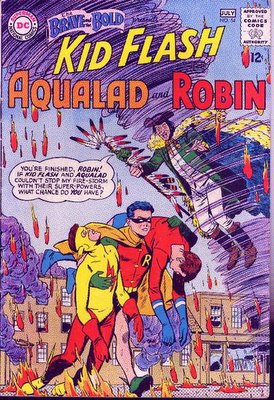
That's right! It's a group made up of sidekicks! It's just like The Justice League, except they're kids and there are only three of them. The only things that might keep them from great commercial success is the fact that their leader doesn't have any superpowers and a full third of their team is not even a fish-talking superhero, but a fish-talking superhero trainee. When the group returned a year later, they found a novel way of remedying their biggest problem.
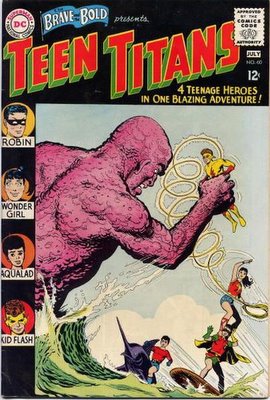
By adding Wonder Girl to the team, they were able to reduce the proportion of the team made up of Aqualad by over 8%. Thus, the Teen Titans were born. At first, I found it a bit suspicious that only a couple of years after Marvel introduced a team of teenage superheroes, D.C. introduced a group of teenage superheroes. However, having read them both, I can say that there is no comparison between The X-Men and The Teen Titans. Teen Titans cut out the teenage angst, the constant moralizing, the forced political allegory, and any pretentious semblance of depth and got right to the surfing and motorcycling.

Cowabunga! This was a comic that could really talk to the kids in their own language - like in one comic where the Titans show up in a town where all of the teenagers have disappeared, leaving a note that says, "All us cats deciced to skip / Until adults to the music get hip!" Robin sensed something was amiss. He said, "Fellows, that note's a phony! No teen-ager would use the word 'music' in a hip language message... They'd use 'jive!'" You cannot honestly tell me that your life is the same now as it was before you read that.
Those of you who remember that the "Wonder Girl" from Wonder Woman comics was just a product of trick photography may be confused as to how she could be on a team with Robin, Kid Flash, and Aqualad. The actual explanation for that is that Teen Titans creator Bob Haney hadn't actually read those comics and was under the impression that Wonder Girl and Wonder Woman were two separate characters. Oops. You'd think that he might have tried reading some of those comics before finishing writing his own comic, or at least that his editor would say something, but personally, I don't blame them. I can attest to how hard these Silver Age comics are to actually read through. Writer Bob Haney and editor George Kashdan by not reading the Wonder Girl stories were trying to avoid the psychological deterioration so common among comic writers of the time, like poor Robert Kanigher, who I imagine ended up opening fire on a local Denny's, believing himself to be the Avenging Angel of Death.
Half a decade later, Marv Wolfman - the writer with the spookiest name ever - noticed the error and wasted no time correcting it. In a story buried in the back pages of Teen Titans #22, he explained that this Wonder Girl was not Wonder Woman as a teenager, but Donna Troy, who Wonder Woman had rescued from a fire that had killed her parents when she was a baby. Wonder Woman took Donna to Paradise Island, where she gained superpowers using a device created called "The Purple Ray". Real slick, Marv. Then, so that readers wouldn't confuse the nascent Donna Troy with Wonder Woman, they gave her a new costume.
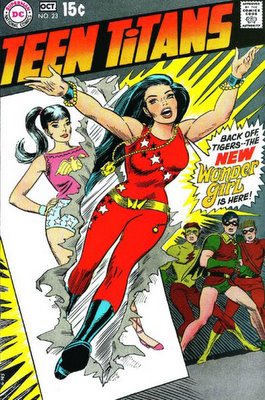
Suffering Sappho! It's the Disco Amazon! This new costume raised a number of questions, foremost among them, "Who is responsible for this?" and "Was he allowed to live?"
Did you get all of that? Well, it doesn't matter if you did. Forget it. It never happened. You have just experienced the magic of retcon.
"Retcon" is an impossibly geeky word. If you ever hear someone use this word, it is perfectly acceptable to beat him up, take his lunch money, and stuff him in his locker. Really, he's asking for it.
Retcon is a portmanteau (another really, really geeky word) that is short for retroactive continuity. It describes when something that has already happened in a serialized story changes. You see, usually in comic books and other forms of serialized story-telling, the events in one issue occur, then the events of the following issue occur. Sometimes, the events in one issue require something to have happened previously or something that we had previously seen happen not to have happened, so the writer explains what really happened in the new comic, retroactively changing the story that you had been reading, and then the readers have conniptions.
The D.C. Universe (where Wonder Woman is from (I think it's somewhere in Turkey)) has many problems with retcon, owing largely to the fact that their writers are completely insane. You see, back in the 40's and early 50's, there were many, many superhero comics, including The Flash and Green Lantern, but there was a declining market for superhero comics (which some assholes blame on Dr. Fredric Wertham), so by the mid-to-late 50's the only superhero comics left were Batman, Superman, and Wonder Woman (Yay, Wonder Woman!). In the late 50's, D.C. tried to bring back some of the old characters, but rather than have the characters who had failed and been cancelled return, they created new characters with the same powers. In fact, the new Flash had read the old The Flash comics when he was younger. You see in the new The Flash, the old Flash was a fictional character. Try to keep up. The problem arose when the new Flash teamed up with Superman, because some readers noticed that the Superman who was teaming up with the Flash was the same Superman who had teamed up with the old Flash who was now a fictional character in the Flash's world, which means that Superman was... ERROR! ERROR! DOES NOT COMPUTE! Then their brains exploded.
Facing litigation from the families of those whose heads exploded, The Flash's writer Gardner Fox wrote a comic to explain this. The story goes that The Flash ran so fast that he ripped a hole in reality. For those of you who doubt that this is what happens when you run really fast, keep in mind that you don't have a degree in relativistic physics and neither does Gardner Fox, so it's your word against his. Anyway, The Flash ended up on another reality, where the old Flash lived. It turns out that this world was the one that all of the comics prior to 1959 had taken place on. They had their own Superman and Wonder Woman and Batman who were all older than on the new Flash's world. So everything made sense, or as much sense as things ever make in D.C. The new Flash called his world "Earth 1" and the other world "Earth 2." So the first Flash lives on Earth 2. It was at that point that I should have stopped trying to figure out what was going on with D.C.
Things were stable like that for a while. Every once in a while, the characters from the two Earths would team up for some adventures. D.C. started printing comics that took place on Earth 2. Then, in 1985, D.C. decided that things were too complicated what with more than one Earth, so they resolved to make everything even more complicated by moving everyone onto the same Earth. This required the largest retcon ever, which they called, "The Crisis on Infinite Earths."
To explain "The Crisis on Infinite Earths," Teen Titans writer Marv Wolfman wrote a horrible comic called The Crisis on Infinite Earths. It's not quite as bad as Grant Morrison's "Planet X," but on the other hand, it isn't as good as a root canal. When my friend Mike asked me to explain it to him so that he didn't have to read it himself, I wrote this. It's a scene-by-scene paraphrasing of the entire comic (trust me, the whole thing being in present tense was more annoying to write than it is to read) written in the scatter-brained style in which I write everything. I tried to be thorough, because if I missed anything, then some day, someone could be reading a comic that made reference to that one thing that I missed and would feel compelled to read The Crisis on Infinite Earths, and I don't want that on my conscience.
For those of you who are willing to just take my word for it, in "Post-Crisis" D.C., everyone is on the same Earth (except the ones who aren't) and all of the comics printed before 1985 no longer exist, and there is a comic that explains everything, but it doesn't do a very good job of that, considering it doesn't make any damn sense.

After The Crisis, the Wonder Woman series restarted from the beginning. The problem with that was that Wonder Woman was now a new superhero, but Wonder Girl was already an established member of the Teen Titans. This called for a new origin story. In the Post-Crisis story, Donna was not rescued from the fire that killed her parents by Wonder Woman, but by the Titans - not the Teen ones, but the actual Titans of Greek mythology. They trained her and gave her superpowers on their home base in outer space, then sent her to Earth. Naturally, nobody had remembered any of this before because the Titans had given Wonder Girl false memories, which is one of those great convenient plot devices for changing someone's origin. On Earth, Donna had taken on the role of Wonder Girl, modeling herself after Wonder Woman - not the current Wonder Woman, but the Wonder Woman who had fought in World War II, who was the current Wonder Woman's mother Hippolyta. Once Donna regained her memories, she abandoned her Wonder Girl identity and became Troia. She also got a new costume (Thank God).
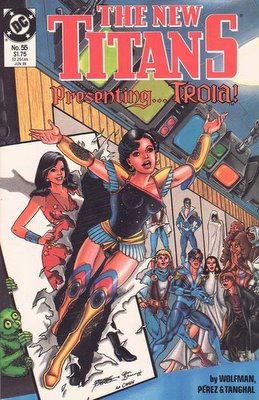
When John Byrne took over writing Wonder Woman, he decided that the biggest problem with Wonder Girl was that her origin story wasn't complicated enough. He did his best to try to correct that. The quick version is that Dark Angel, an enemy of the old Wonder Woman from World War II vowed to take revenge by abducting Wonder Woman's (Hippolyta's) daughter, but she accidentally abducted Donna who she had mistaken for Wonder Woman (the current one), because it turned out that before she was in the fire that the Titans saved her from, Donna was actually a duplicate of Wonder Woman created by an Amazon sorceress to be her childhood playmate. Dark Angel then transported Donna to a series of alternate realities, where she would be forced to live the lives of alternate Donna Troys, each one frought with great tragedy. Dark Angel's plan backfired, though, because Donna was actually made stronger by her experiences and became a composite of all of the alternate versions of herself. Oh, by the way, it turned out that Dark Angel was herself an alternate reality's Donna Troy.
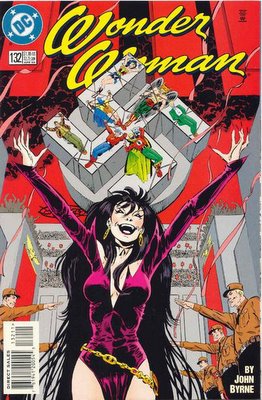
Pardon me if I just BLEW YOUR MIND!
On Dark Angel's reality, she wasn't saved from the fire by Wonder Woman or the Titans, but by the Anti-Monitor - the evil ruler of the evil antimatter universe. Anti-Monitor, much like Wonder Woman and the Titans, trained Donna and gave her superpowers, but he did it all evilly. The important thing to take away from this is comic books once again trumping "real" science. Hey, if Hermann Weyl was so smart, how come he never even considered the relative morality of the positron? It took John Byrne to discover that antimatter sided with the Nazis in World War II. If that's not evil, I don't know what is.
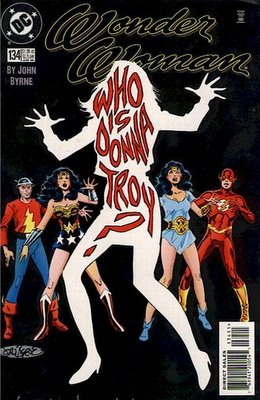
Now that we have the whole story, I return to the question that started this, "Who is Donna Troy?" Maybe she is just a girl in a Wonder Woman costume. Maybe in spirit, she is every girl in a Wonder Woman costume. I am reminded of a maxim that goes, "He who reads a Wonder Girl origin story knows who Donna Troy is. He who reads two Wonder Girl origin stories is never sure."


10 Comments:
(speechless)
xo
jen
Hey Marvel Zombie, give DC some credit for carrying Fallen Angel for a year and a half. If my memory serves me correctly, there's some of the "synthetic goo" supergirl in her too?
RE: Grant Morrison
You are mistaken, and your ill thought out arguments merely confirm this.
Sorry
Very interesting thanks. I believe there's even more that could be on there! keep it up essayforme
Here You can Watch nice collection of New Year Messages 2016
New year messages 2016
New year messages
Our company Perfect Essays Online hire the most well-organized and friendly team of specialists! Our term paper writers are highly experienced! Most of them are teachers acting in the most prestigious colleges of the country! Be sure, we trust in writing of your essay only to trusted writers!
The main goal of our essay writing company is apositive result and complete satisfaction of all the demands made by the client! Our managers chose the best candidate of all our specialists in a particular area of science and well-versed in the required subject!
I am happy to find so many useful information here in the post, thanks for sharing.
I really enjoy reading your blog. He makes me feel very real, just wanted to tell you, you like your work, I appreciate. This is absolutely a great blog. Support you! Continue to follow the author's career.
I find it interesting how comics can appeal to different people for various reasons.
Post a Comment
<< Home